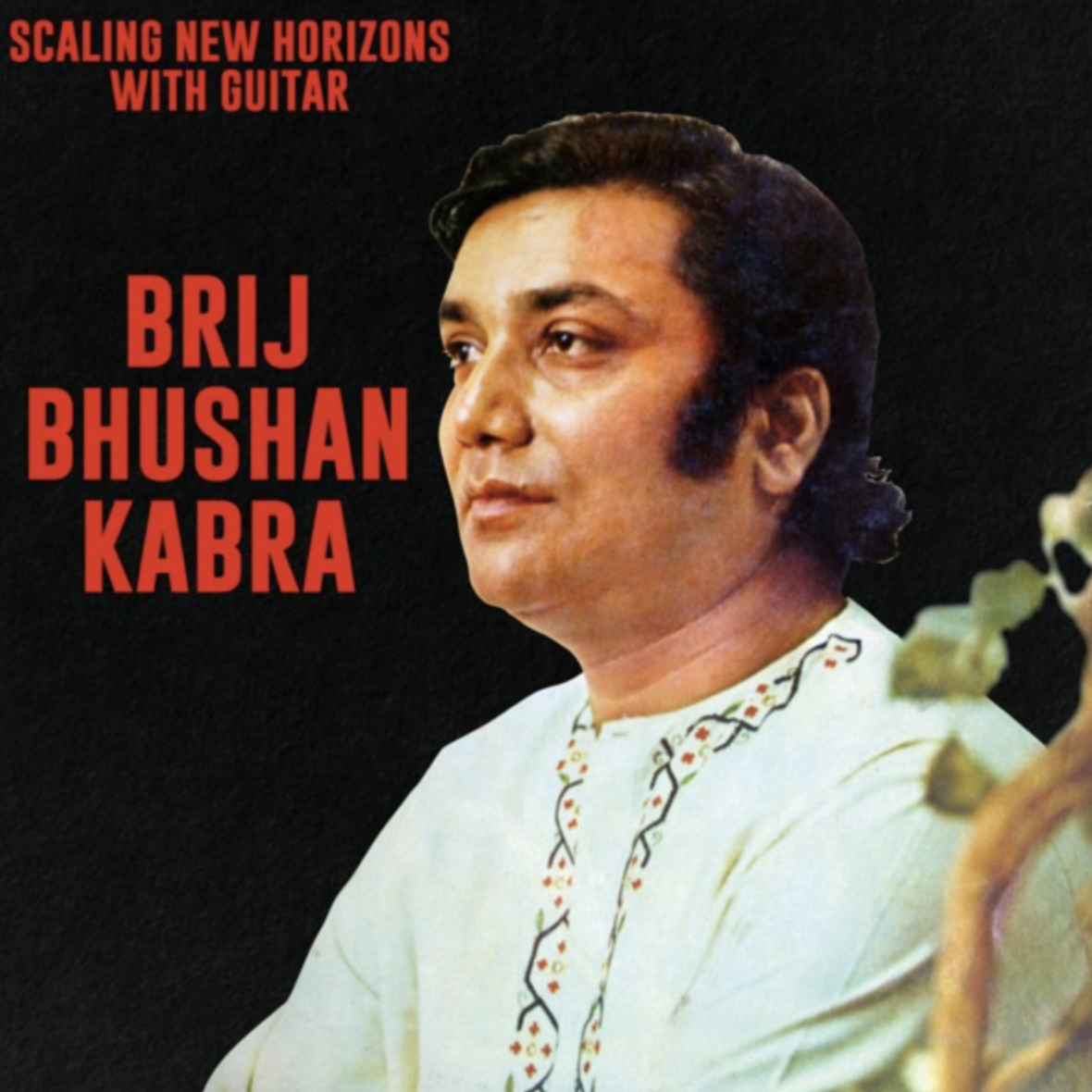Brij Bhushan Kabra - Scaling New Horizons With Guitar LP
Brij Bhushan Kabra - Scaling New Horizons With Guitar LP
In the 1920s, Tau Moe (pronounced mo-ay), a Hawaiian musician, arrived in India and introduced Hawaiian music to the Sub Continent. After settling in Calcutta in the early 1940’s, Moe and his family performed, taught and introduced Hawaiian music by building and selling guitars to the local musicians. Indian filmmakers and composers quickly fell under the spell of these instruments and sounds and made them suitable for playing ragas— the melodic patterns and modes in traditional Indian compositions. Soon these hot-rod guitars were accepted as legitimate instruments for performing Indian classical music, and a new breed of virtuosos emerged to write yet another chapter of the guitar’s unpredictable evolution.
Brij Bhushan Kabra was one of the Indian musicians who heard the steel guitar’s siren call, but his vision went beyond adapting Hawaiian sounds to popular music. Instead, he saw the instrument’s potential for playing ragas. To pursue this dream, Kabra began studying with Ali Akbar Khan, whose fretless sarod offered a sonic example for Kabra to emulate with his lap-slide guitar. Kabra’s instrument was a Gibson Super 400, modified with a drone string and a high nut to raise the strings off the fretboard like a lap steel. Seated on the floor in the traditional style of Indian musicians, Kabra played his guitar horizontally, using a fingerstyle plucking technique and a bar to contact the strings. His approach set the standard for virtually all Indian slide guitarists. He is rightfully considered a master musician and regarded as on of Indian Classical music’s most renowned ambassadors’ to the rest of the world.
Scaling New Horizons With Guitar is considered by many one of Kabra's masterpieces. Released in 1976 and out of print for over 45 years, this is the first reissue in any format. Newly remastered for this edition. Limited edition pressing.
Brij Bhushan Kabra - Scaling New Horizons With Guitar LP
In den 1920er Jahren kam Tau Moe (ausgesprochen mo-ay), ein hawaiianischer Musiker, nach Indien und brachte die hawaiianische Musik auf den Subkontinent. Nachdem er sich in den frühen 1940er Jahren in Kalkutta niedergelassen hatte, traten Moe und seine Familie auf, unterrichteten und führten hawaiianische Musik ein, indem sie Gitarren bauten und an die örtlichen Musiker verkauften. Indische Filmemacher und Komponisten gerieten schnell in den Bann dieser Instrumente und Klänge und nutzten sie zum Spielen von Ragas - den melodischen Mustern und Modi in traditionellen indischen Kompositionen. Schon bald wurden diese "Hot-Rod"-Gitarren als legitime Instrumente für die Aufführung klassischer indischer Musik akzeptiert, und eine neue Generation von Virtuosen entstand, die ein weiteres Kapitel in der unvorhersehbaren Entwicklung der Gitarre schrieb.
Brij Bhushan Kabra war einer der indischen Musiker, die den Sirenenruf der Steel-Guitar hörten, aber seine Vision ging über die Anpassung hawaiianischer Klänge an die populäre Musik hinaus. Stattdessen sah er das Potenzial des Instruments für das Spielen von Ragas. Um diesen Traum zu verwirklichen, begann Kabra bei Ali Akbar Khan zu lernen, dessen bundlose Sarod ein klangliches Vorbild für Kabra war, dem er mit seiner Lap-Slide-Gitarre nacheiferte. Kabras Instrument war eine Gibson Super 400, modifiziert mit einer Bordunsaite und einem hohen Sattel, um die Saiten wie bei einer Lap Steel vom Griffbrett abzuheben. Im traditionellen Stil indischer Musiker auf dem Boden sitzend, spielte Kabra seine Gitarre horizontal, wobei er eine Fingerstyle-Zupftechnik und einen Steg zum Anschlagen der Saiten verwendete. Sein Ansatz setzte den Standard für praktisch alle indischen Slide-Gitarristen. Er wird zu Recht als Meistermusiker angesehen und gilt als einer der renommiertesten Botschafter der klassischen indischen Musik in der ganzen Welt.
Scaling New Horizons With Guitar wird von vielen als eines von Kabras Meisterwerken angesehen. Das 1976 veröffentlichte und seit über 45 Jahren vergriffene Werk wird hier zum ersten Mal in einem anderen Format wiederveröffentlicht. Für diese Ausgabe neu gemastert. Limitierte Auflage.

Mississippi Records
Selber waren wir leider noch nie bei Mississippi Records aber das Label hat sich in den letzten 12 Jahren ein Namen gemacht durch Veröffentlichungen von obskuren Raritäten, wunderbaren Blues & Folk Reissues und sensationellen Mix-Kasetten. Allesamt mit den grossartigsten Covers überhaupt. Mississippi Records-Releases werden nur auf Vinyl und oft in kleinsten Stückzahlen veröffentlicht.
EN: Unfortunately we have never been there ourselves at Mississippi Records but the label has made a name for itself over the past 12 years with releases of obscure rarities, wonderful Blues & Folk Reissues and sensational mix tapes. All with the greatest covers ever. Mississippi Records are released on vinyl only and often in small quantities.

